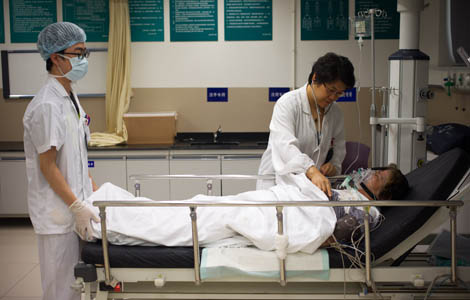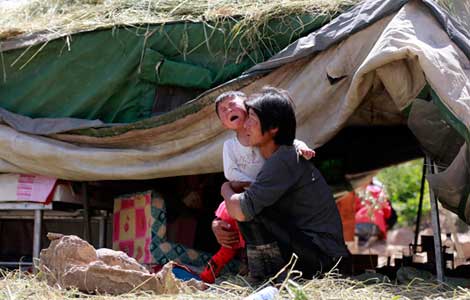Xi urges rural development
Updated: 2013-07-24 01:17
By JIN ZHU and ZHOU LIHUA (China Daily)
|
||||||||
President Xi Jinping called for more efforts to boost the development of rural areas and promote more urban and rural integration.
Even if the number of people living in cities reaches 70 percent of the population, 400 million to 500 million people will still live in rural areas. Those regions must not become deserted and remain only as hometowns in people's memories, Xinhua News Agency quoted Xi as saying.
In 2012, about 52 percent of the Chinese population lived in urban areas, a 20 percent increase from the early 1980s, according to the National Development and Reform Commission.
Xi urged local governments to promote the simultaneous development of urban construction and modern agriculture.
A beautiful countryside should be created for the benefit of farmers. Money should not be wasted on extravagances, such as whitewashing a house's exterior to hide its shabby rooms, Xi said during a visit to Ezhou in Hubei province on Monday.
Meanwhile, ancient villages should be protected during rural modernization, he said.
Xi also visited a hybrid rice breeding station in Ezhou, which was developed by a scientific group led by Wuhan University Professor Zhu Yingguo.
"It was my first time to meet President Xi," Zhu said. "He was very nice and approachable. Moreover, he was quite familiar with agricultural issues and asked me many professional questions during his 20-minute stay."
Xi also inspected rice in the field, Xinhua reported.
Xi encouraged agricultural scientists to continue their hard work because the country's food safety has to be guaranteed.
"His visit shows a high degree of concern for the country's agricultural and rural development among senior government authorities," Zhu said.
Varieties of hybrid rice developed by Zhu's group have been widely planted in central and southern parts of China, such as Hubei, Hunan and Hainan provinces, and the Guangxi Zhuang autonomous region, he said.
China will accelerate the pace of its urbanization in the next 20 years, with the urban population expected to be 70 to 75 percent by the end of 2030, according to a report from the Chinese Academy of Social Sciences in 2011.
Feng Qiaobin, a professor of economics at the Chinese Academy of Governance, said creating a modern agricultural industry and developed rural areas is an important part of the country's future urbanization.
"For a new urbanization in China, more effort should be devoted to the development of small cities and towns," she said.
"A future goal of China's urbanization is to realize that people can enjoy equal public services, such as education and medical services, no matter where they choose to live."
Xi also visited Wuhan GEM Resource Recycling on Monday. Measures for recycling and turning waste into treasure are a science and art, he said.
Saving resources and environmental protection are the inevitable requirements of the country's development, he said.
Xi braved heavy rain on Sunday on his visit to the new river port of Wuhan. He inquired about the logistics of the Yangtze River and called for more efforts to tap into the transportation potential of the river channel.
Xi was also impressed by the administrative service center in Wuhan, saying he "feels comfortable" to see the center is so "grand and spacious".
The center, which opened in September, provides residents with more efficient administrative approval from 66 government departments.
Liu Kun in Wuhan contributed to this story.
Most Viewed
Editor's Picks

|

|

|

|

|

|
Today's Top News
US diplomat says China ties a priority
Nation falling short on IT security
Weiner not dropping out of NYC mayoral race
Death toll from H1N1 in Argentina reaches 38
DPRK halt on rocket facility confirmed
Celebrations erupt after word of regal delivery
Office to close due to protest in Manila
Multinationals' dependence on China grows
US Weekly

|

|
















